Entrepreneurship and Small Business Management: Analysis and Impact
VerifiedAdded on 2020/09/09
|11
|5136
|165
Report
AI Summary
This report provides a comprehensive overview of entrepreneurship and small business management, covering various venture types including small business entrepreneurship, scalable start-up entrepreneurship, large company entrepreneurship, and social entrepreneurship. It explores the similarities and differences between these ventures, highlighting the role of entrepreneurs in both the public and corporate sectors, with examples like 3M and W.L. Gore. The report examines the scope, development, and growth of entrepreneurial ventures, as well as the impact of micro and small businesses on the economy, supported by statistical data. It also explains the importance of small businesses and start-ups to the growth of the social economy, emphasizing their contribution to job creation, local economic development, and overall national economic growth. The analysis includes a discussion of the characteristics and skills needed for entrepreneurial success, emphasizing the importance of experience and historical context.
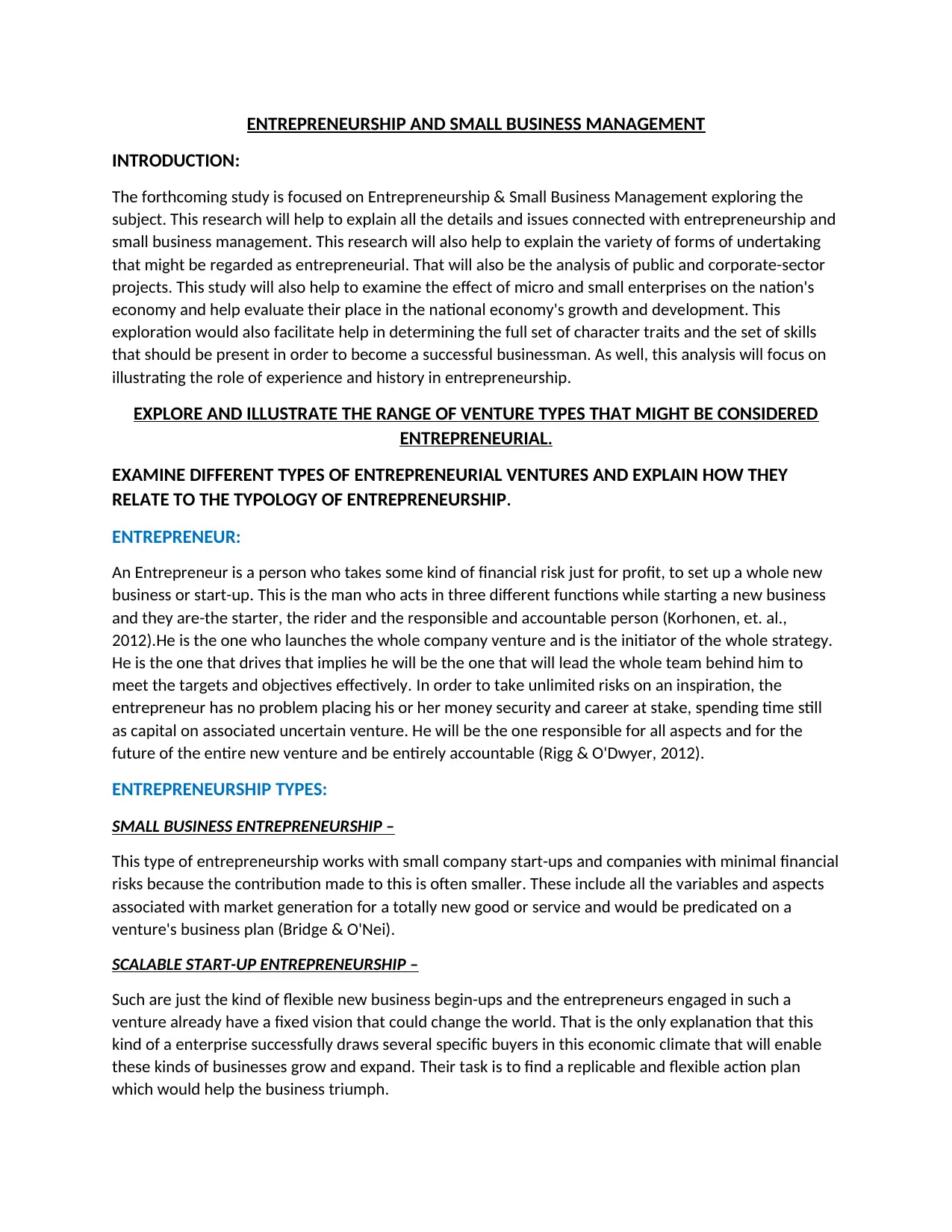
ENTREPRENEURSHIP AND SMALL BUSINESS MANAGEMENT
INTRODUCTION:
The forthcoming study is focused on Entrepreneurship & Small Business Management exploring the
subject. This research will help to explain all the details and issues connected with entrepreneurship and
small business management. This research will also help to explain the variety of forms of undertaking
that might be regarded as entrepreneurial. That will also be the analysis of public and corporate-sector
projects. This study will also help to examine the effect of micro and small enterprises on the nation's
economy and help evaluate their place in the national economy's growth and development. This
exploration would also facilitate help in determining the full set of character traits and the set of skills
that should be present in order to become a successful businessman. As well, this analysis will focus on
illustrating the role of experience and history in entrepreneurship.
EXPLORE AND ILLUSTRATE THE RANGE OF VENTURE TYPES THAT MIGHT BE CONSIDERED
ENTREPRENEURIAL.
EXAMINE DIFFERENT TYPES OF ENTREPRENEURIAL VENTURES AND EXPLAIN HOW THEY
RELATE TO THE TYPOLOGY OF ENTREPRENEURSHIP.
ENTREPRENEUR:
An Entrepreneur is a person who takes some kind of financial risk just for profit, to set up a whole new
business or start-up. This is the man who acts in three different functions while starting a new business
and they are-the starter, the rider and the responsible and accountable person (Korhonen, et. al.,
2012).He is the one who launches the whole company venture and is the initiator of the whole strategy.
He is the one that drives that implies he will be the one that will lead the whole team behind him to
meet the targets and objectives effectively. In order to take unlimited risks on an inspiration, the
entrepreneur has no problem placing his or her money security and career at stake, spending time still
as capital on associated uncertain venture. He will be the one responsible for all aspects and for the
future of the entire new venture and be entirely accountable (Rigg & O'Dwyer, 2012).
ENTREPRENEURSHIP TYPES:
SMALL BUSINESS ENTREPRENEURSHIP –
This type of entrepreneurship works with small company start-ups and companies with minimal financial
risks because the contribution made to this is often smaller. These include all the variables and aspects
associated with market generation for a totally new good or service and would be predicated on a
venture's business plan (Bridge & O'Nei).
SCALABLE START-UP ENTREPRENEURSHIP –
Such are just the kind of flexible new business begin-ups and the entrepreneurs engaged in such a
venture already have a fixed vision that could change the world. That is the only explanation that this
kind of a enterprise successfully draws several specific buyers in this economic climate that will enable
these kinds of businesses grow and expand. Their task is to find a replicable and flexible action plan
which would help the business triumph.
INTRODUCTION:
The forthcoming study is focused on Entrepreneurship & Small Business Management exploring the
subject. This research will help to explain all the details and issues connected with entrepreneurship and
small business management. This research will also help to explain the variety of forms of undertaking
that might be regarded as entrepreneurial. That will also be the analysis of public and corporate-sector
projects. This study will also help to examine the effect of micro and small enterprises on the nation's
economy and help evaluate their place in the national economy's growth and development. This
exploration would also facilitate help in determining the full set of character traits and the set of skills
that should be present in order to become a successful businessman. As well, this analysis will focus on
illustrating the role of experience and history in entrepreneurship.
EXPLORE AND ILLUSTRATE THE RANGE OF VENTURE TYPES THAT MIGHT BE CONSIDERED
ENTREPRENEURIAL.
EXAMINE DIFFERENT TYPES OF ENTREPRENEURIAL VENTURES AND EXPLAIN HOW THEY
RELATE TO THE TYPOLOGY OF ENTREPRENEURSHIP.
ENTREPRENEUR:
An Entrepreneur is a person who takes some kind of financial risk just for profit, to set up a whole new
business or start-up. This is the man who acts in three different functions while starting a new business
and they are-the starter, the rider and the responsible and accountable person (Korhonen, et. al.,
2012).He is the one who launches the whole company venture and is the initiator of the whole strategy.
He is the one that drives that implies he will be the one that will lead the whole team behind him to
meet the targets and objectives effectively. In order to take unlimited risks on an inspiration, the
entrepreneur has no problem placing his or her money security and career at stake, spending time still
as capital on associated uncertain venture. He will be the one responsible for all aspects and for the
future of the entire new venture and be entirely accountable (Rigg & O'Dwyer, 2012).
ENTREPRENEURSHIP TYPES:
SMALL BUSINESS ENTREPRENEURSHIP –
This type of entrepreneurship works with small company start-ups and companies with minimal financial
risks because the contribution made to this is often smaller. These include all the variables and aspects
associated with market generation for a totally new good or service and would be predicated on a
venture's business plan (Bridge & O'Nei).
SCALABLE START-UP ENTREPRENEURSHIP –
Such are just the kind of flexible new business begin-ups and the entrepreneurs engaged in such a
venture already have a fixed vision that could change the world. That is the only explanation that this
kind of a enterprise successfully draws several specific buyers in this economic climate that will enable
these kinds of businesses grow and expand. Their task is to find a replicable and flexible action plan
which would help the business triumph.
Paraphrase This Document
Need a fresh take? Get an instant paraphrase of this document with our AI Paraphraser
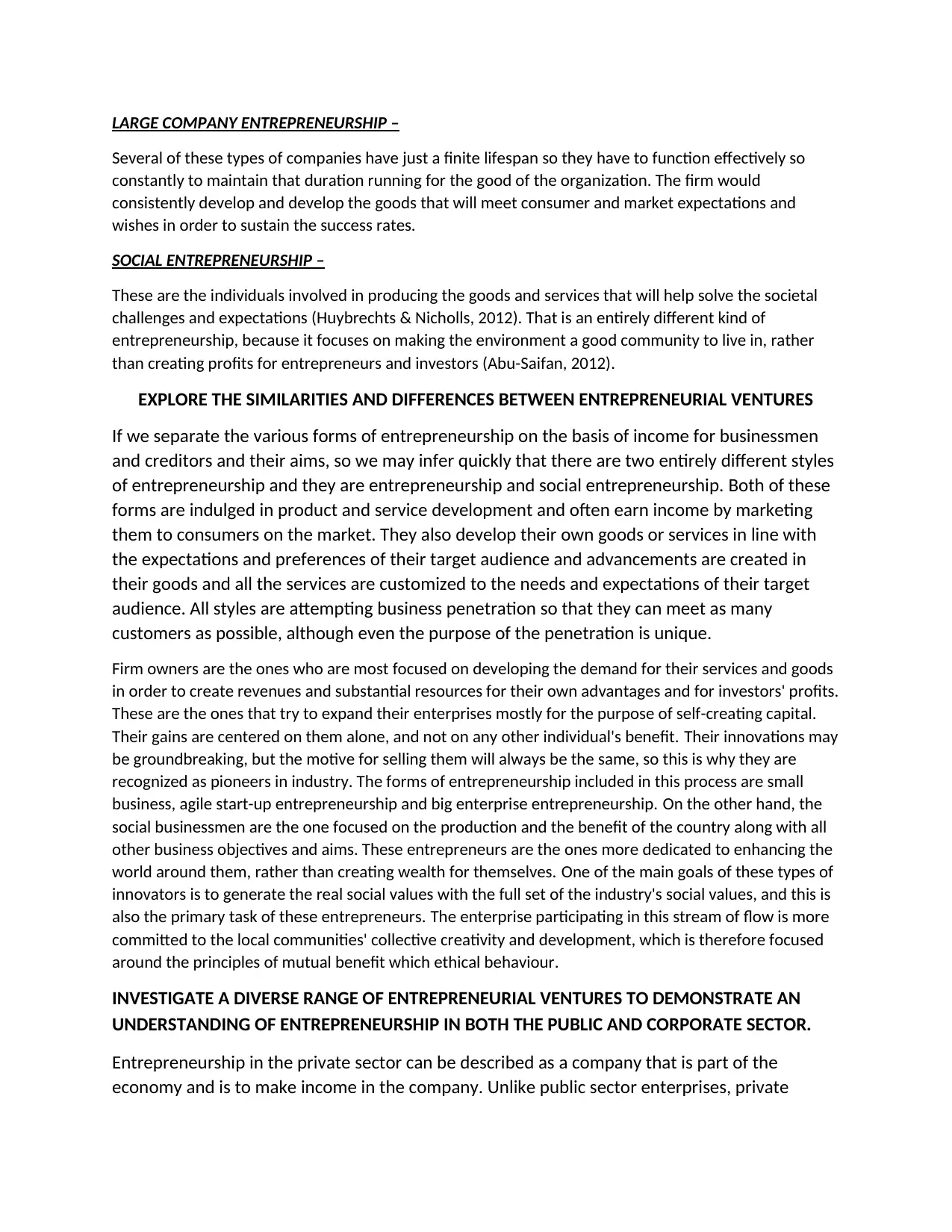
LARGE COMPANY ENTREPRENEURSHIP –
Several of these types of companies have just a finite lifespan so they have to function effectively so
constantly to maintain that duration running for the good of the organization. The firm would
consistently develop and develop the goods that will meet consumer and market expectations and
wishes in order to sustain the success rates.
SOCIAL ENTREPRENEURSHIP –
These are the individuals involved in producing the goods and services that will help solve the societal
challenges and expectations (Huybrechts & Nicholls, 2012). That is an entirely different kind of
entrepreneurship, because it focuses on making the environment a good community to live in, rather
than creating profits for entrepreneurs and investors (Abu-Saifan, 2012).
EXPLORE THE SIMILARITIES AND DIFFERENCES BETWEEN ENTREPRENEURIAL VENTURES
If we separate the various forms of entrepreneurship on the basis of income for businessmen
and creditors and their aims, so we may infer quickly that there are two entirely different styles
of entrepreneurship and they are entrepreneurship and social entrepreneurship. Both of these
forms are indulged in product and service development and often earn income by marketing
them to consumers on the market. They also develop their own goods or services in line with
the expectations and preferences of their target audience and advancements are created in
their goods and all the services are customized to the needs and expectations of their target
audience. All styles are attempting business penetration so that they can meet as many
customers as possible, although even the purpose of the penetration is unique.
Firm owners are the ones who are most focused on developing the demand for their services and goods
in order to create revenues and substantial resources for their own advantages and for investors' profits.
These are the ones that try to expand their enterprises mostly for the purpose of self-creating capital.
Their gains are centered on them alone, and not on any other individual's benefit. Their innovations may
be groundbreaking, but the motive for selling them will always be the same, so this is why they are
recognized as pioneers in industry. The forms of entrepreneurship included in this process are small
business, agile start-up entrepreneurship and big enterprise entrepreneurship. On the other hand, the
social businessmen are the one focused on the production and the benefit of the country along with all
other business objectives and aims. These entrepreneurs are the ones more dedicated to enhancing the
world around them, rather than creating wealth for themselves. One of the main goals of these types of
innovators is to generate the real social values with the full set of the industry's social values, and this is
also the primary task of these entrepreneurs. The enterprise participating in this stream of flow is more
committed to the local communities' collective creativity and development, which is therefore focused
around the principles of mutual benefit which ethical behaviour.
INVESTIGATE A DIVERSE RANGE OF ENTREPRENEURIAL VENTURES TO DEMONSTRATE AN
UNDERSTANDING OF ENTREPRENEURSHIP IN BOTH THE PUBLIC AND CORPORATE SECTOR.
Entrepreneurship in the private sector can be described as a company that is part of the
economy and is to make income in the company. Unlike public sector enterprises, private
Several of these types of companies have just a finite lifespan so they have to function effectively so
constantly to maintain that duration running for the good of the organization. The firm would
consistently develop and develop the goods that will meet consumer and market expectations and
wishes in order to sustain the success rates.
SOCIAL ENTREPRENEURSHIP –
These are the individuals involved in producing the goods and services that will help solve the societal
challenges and expectations (Huybrechts & Nicholls, 2012). That is an entirely different kind of
entrepreneurship, because it focuses on making the environment a good community to live in, rather
than creating profits for entrepreneurs and investors (Abu-Saifan, 2012).
EXPLORE THE SIMILARITIES AND DIFFERENCES BETWEEN ENTREPRENEURIAL VENTURES
If we separate the various forms of entrepreneurship on the basis of income for businessmen
and creditors and their aims, so we may infer quickly that there are two entirely different styles
of entrepreneurship and they are entrepreneurship and social entrepreneurship. Both of these
forms are indulged in product and service development and often earn income by marketing
them to consumers on the market. They also develop their own goods or services in line with
the expectations and preferences of their target audience and advancements are created in
their goods and all the services are customized to the needs and expectations of their target
audience. All styles are attempting business penetration so that they can meet as many
customers as possible, although even the purpose of the penetration is unique.
Firm owners are the ones who are most focused on developing the demand for their services and goods
in order to create revenues and substantial resources for their own advantages and for investors' profits.
These are the ones that try to expand their enterprises mostly for the purpose of self-creating capital.
Their gains are centered on them alone, and not on any other individual's benefit. Their innovations may
be groundbreaking, but the motive for selling them will always be the same, so this is why they are
recognized as pioneers in industry. The forms of entrepreneurship included in this process are small
business, agile start-up entrepreneurship and big enterprise entrepreneurship. On the other hand, the
social businessmen are the one focused on the production and the benefit of the country along with all
other business objectives and aims. These entrepreneurs are the ones more dedicated to enhancing the
world around them, rather than creating wealth for themselves. One of the main goals of these types of
innovators is to generate the real social values with the full set of the industry's social values, and this is
also the primary task of these entrepreneurs. The enterprise participating in this stream of flow is more
committed to the local communities' collective creativity and development, which is therefore focused
around the principles of mutual benefit which ethical behaviour.
INVESTIGATE A DIVERSE RANGE OF ENTREPRENEURIAL VENTURES TO DEMONSTRATE AN
UNDERSTANDING OF ENTREPRENEURSHIP IN BOTH THE PUBLIC AND CORPORATE SECTOR.
Entrepreneurship in the private sector can be described as a company that is part of the
economy and is to make income in the company. Unlike public sector enterprises, private
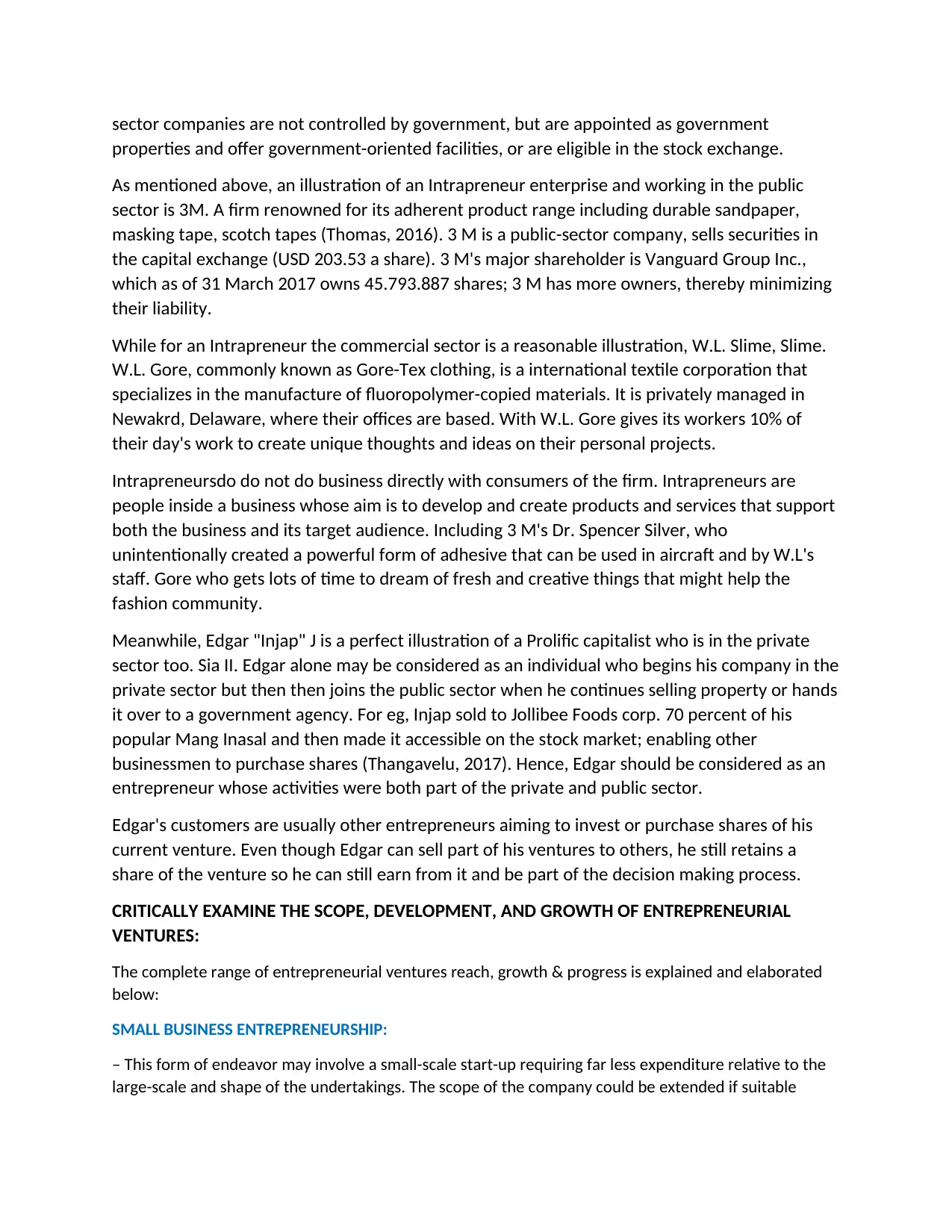
sector companies are not controlled by government, but are appointed as government
properties and offer government-oriented facilities, or are eligible in the stock exchange.
As mentioned above, an illustration of an Intrapreneur enterprise and working in the public
sector is 3M. A firm renowned for its adherent product range including durable sandpaper,
masking tape, scotch tapes (Thomas, 2016). 3 M is a public-sector company, sells securities in
the capital exchange (USD 203.53 a share). 3 M's major shareholder is Vanguard Group Inc.,
which as of 31 March 2017 owns 45.793.887 shares; 3 M has more owners, thereby minimizing
their liability.
While for an Intrapreneur the commercial sector is a reasonable illustration, W.L. Slime, Slime.
W.L. Gore, commonly known as Gore-Tex clothing, is a international textile corporation that
specializes in the manufacture of fluoropolymer-copied materials. It is privately managed in
Newakrd, Delaware, where their offices are based. With W.L. Gore gives its workers 10% of
their day's work to create unique thoughts and ideas on their personal projects.
Intrapreneursdo do not do business directly with consumers of the firm. Intrapreneurs are
people inside a business whose aim is to develop and create products and services that support
both the business and its target audience. Including 3 M's Dr. Spencer Silver, who
unintentionally created a powerful form of adhesive that can be used in aircraft and by W.L's
staff. Gore who gets lots of time to dream of fresh and creative things that might help the
fashion community.
Meanwhile, Edgar "Injap" J is a perfect illustration of a Prolific capitalist who is in the private
sector too. Sia II. Edgar alone may be considered as an individual who begins his company in the
private sector but then then joins the public sector when he continues selling property or hands
it over to a government agency. For eg, Injap sold to Jollibee Foods corp. 70 percent of his
popular Mang Inasal and then made it accessible on the stock market; enabling other
businessmen to purchase shares (Thangavelu, 2017). Hence, Edgar should be considered as an
entrepreneur whose activities were both part of the private and public sector.
Edgar's customers are usually other entrepreneurs aiming to invest or purchase shares of his
current venture. Even though Edgar can sell part of his ventures to others, he still retains a
share of the venture so he can still earn from it and be part of the decision making process.
CRITICALLY EXAMINE THE SCOPE, DEVELOPMENT, AND GROWTH OF ENTREPRENEURIAL
VENTURES:
The complete range of entrepreneurial ventures reach, growth & progress is explained and elaborated
below:
SMALL BUSINESS ENTREPRENEURSHIP:
– This form of endeavor may involve a small-scale start-up requiring far less expenditure relative to the
large-scale and shape of the undertakings. The scope of the company could be extended if suitable
properties and offer government-oriented facilities, or are eligible in the stock exchange.
As mentioned above, an illustration of an Intrapreneur enterprise and working in the public
sector is 3M. A firm renowned for its adherent product range including durable sandpaper,
masking tape, scotch tapes (Thomas, 2016). 3 M is a public-sector company, sells securities in
the capital exchange (USD 203.53 a share). 3 M's major shareholder is Vanguard Group Inc.,
which as of 31 March 2017 owns 45.793.887 shares; 3 M has more owners, thereby minimizing
their liability.
While for an Intrapreneur the commercial sector is a reasonable illustration, W.L. Slime, Slime.
W.L. Gore, commonly known as Gore-Tex clothing, is a international textile corporation that
specializes in the manufacture of fluoropolymer-copied materials. It is privately managed in
Newakrd, Delaware, where their offices are based. With W.L. Gore gives its workers 10% of
their day's work to create unique thoughts and ideas on their personal projects.
Intrapreneursdo do not do business directly with consumers of the firm. Intrapreneurs are
people inside a business whose aim is to develop and create products and services that support
both the business and its target audience. Including 3 M's Dr. Spencer Silver, who
unintentionally created a powerful form of adhesive that can be used in aircraft and by W.L's
staff. Gore who gets lots of time to dream of fresh and creative things that might help the
fashion community.
Meanwhile, Edgar "Injap" J is a perfect illustration of a Prolific capitalist who is in the private
sector too. Sia II. Edgar alone may be considered as an individual who begins his company in the
private sector but then then joins the public sector when he continues selling property or hands
it over to a government agency. For eg, Injap sold to Jollibee Foods corp. 70 percent of his
popular Mang Inasal and then made it accessible on the stock market; enabling other
businessmen to purchase shares (Thangavelu, 2017). Hence, Edgar should be considered as an
entrepreneur whose activities were both part of the private and public sector.
Edgar's customers are usually other entrepreneurs aiming to invest or purchase shares of his
current venture. Even though Edgar can sell part of his ventures to others, he still retains a
share of the venture so he can still earn from it and be part of the decision making process.
CRITICALLY EXAMINE THE SCOPE, DEVELOPMENT, AND GROWTH OF ENTREPRENEURIAL
VENTURES:
The complete range of entrepreneurial ventures reach, growth & progress is explained and elaborated
below:
SMALL BUSINESS ENTREPRENEURSHIP:
– This form of endeavor may involve a small-scale start-up requiring far less expenditure relative to the
large-scale and shape of the undertakings. The scope of the company could be extended if suitable
⊘ This is a preview!⊘
Do you want full access?
Subscribe today to unlock all pages.

Trusted by 1+ million students worldwide
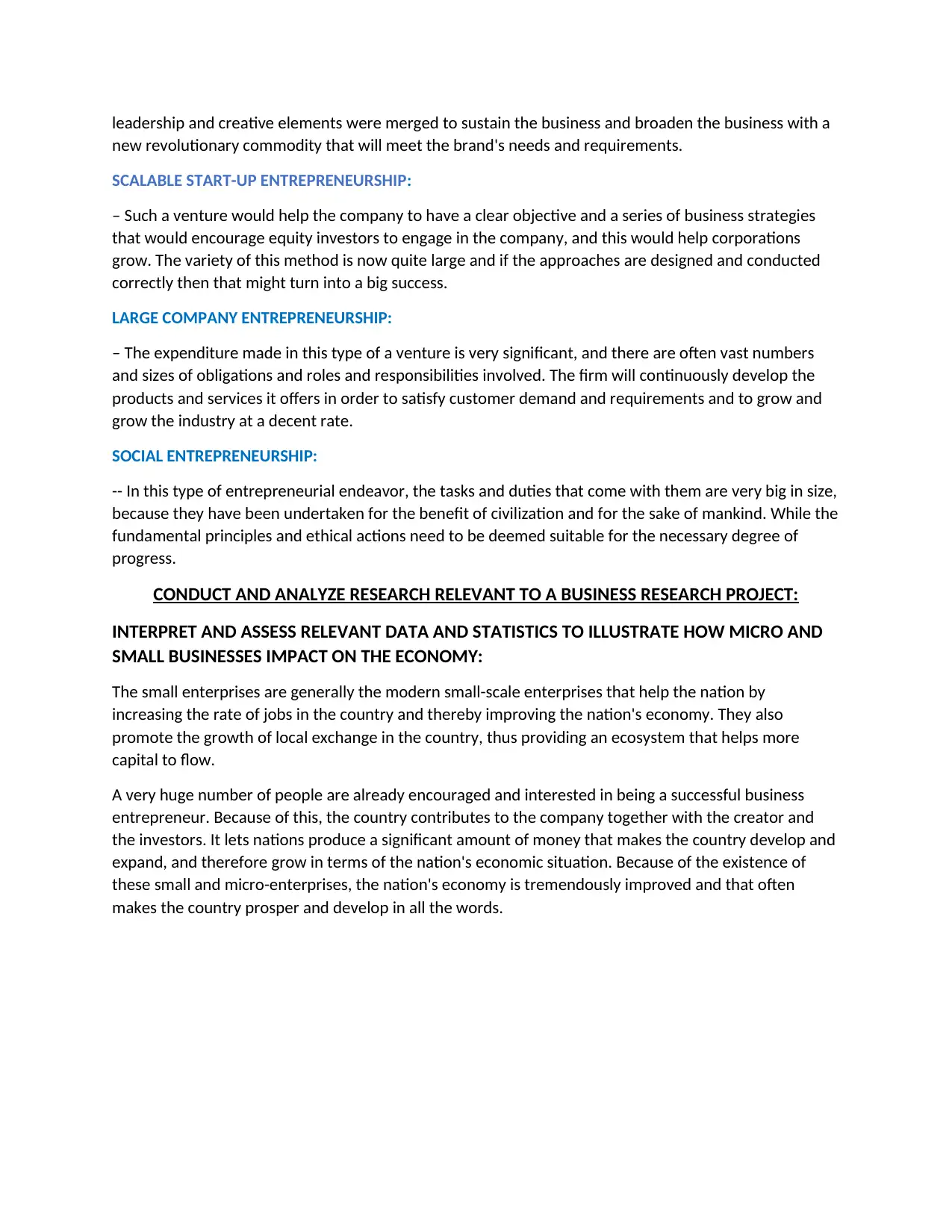
leadership and creative elements were merged to sustain the business and broaden the business with a
new revolutionary commodity that will meet the brand's needs and requirements.
SCALABLE START-UP ENTREPRENEURSHIP:
– Such a venture would help the company to have a clear objective and a series of business strategies
that would encourage equity investors to engage in the company, and this would help corporations
grow. The variety of this method is now quite large and if the approaches are designed and conducted
correctly then that might turn into a big success.
LARGE COMPANY ENTREPRENEURSHIP:
– The expenditure made in this type of a venture is very significant, and there are often vast numbers
and sizes of obligations and roles and responsibilities involved. The firm will continuously develop the
products and services it offers in order to satisfy customer demand and requirements and to grow and
grow the industry at a decent rate.
SOCIAL ENTREPRENEURSHIP:
-- In this type of entrepreneurial endeavor, the tasks and duties that come with them are very big in size,
because they have been undertaken for the benefit of civilization and for the sake of mankind. While the
fundamental principles and ethical actions need to be deemed suitable for the necessary degree of
progress.
CONDUCT AND ANALYZE RESEARCH RELEVANT TO A BUSINESS RESEARCH PROJECT:
INTERPRET AND ASSESS RELEVANT DATA AND STATISTICS TO ILLUSTRATE HOW MICRO AND
SMALL BUSINESSES IMPACT ON THE ECONOMY:
The small enterprises are generally the modern small-scale enterprises that help the nation by
increasing the rate of jobs in the country and thereby improving the nation's economy. They also
promote the growth of local exchange in the country, thus providing an ecosystem that helps more
capital to flow.
A very huge number of people are already encouraged and interested in being a successful business
entrepreneur. Because of this, the country contributes to the company together with the creator and
the investors. It lets nations produce a significant amount of money that makes the country develop and
expand, and therefore grow in terms of the nation's economic situation. Because of the existence of
these small and micro-enterprises, the nation's economy is tremendously improved and that often
makes the country prosper and develop in all the words.
new revolutionary commodity that will meet the brand's needs and requirements.
SCALABLE START-UP ENTREPRENEURSHIP:
– Such a venture would help the company to have a clear objective and a series of business strategies
that would encourage equity investors to engage in the company, and this would help corporations
grow. The variety of this method is now quite large and if the approaches are designed and conducted
correctly then that might turn into a big success.
LARGE COMPANY ENTREPRENEURSHIP:
– The expenditure made in this type of a venture is very significant, and there are often vast numbers
and sizes of obligations and roles and responsibilities involved. The firm will continuously develop the
products and services it offers in order to satisfy customer demand and requirements and to grow and
grow the industry at a decent rate.
SOCIAL ENTREPRENEURSHIP:
-- In this type of entrepreneurial endeavor, the tasks and duties that come with them are very big in size,
because they have been undertaken for the benefit of civilization and for the sake of mankind. While the
fundamental principles and ethical actions need to be deemed suitable for the necessary degree of
progress.
CONDUCT AND ANALYZE RESEARCH RELEVANT TO A BUSINESS RESEARCH PROJECT:
INTERPRET AND ASSESS RELEVANT DATA AND STATISTICS TO ILLUSTRATE HOW MICRO AND
SMALL BUSINESSES IMPACT ON THE ECONOMY:
The small enterprises are generally the modern small-scale enterprises that help the nation by
increasing the rate of jobs in the country and thereby improving the nation's economy. They also
promote the growth of local exchange in the country, thus providing an ecosystem that helps more
capital to flow.
A very huge number of people are already encouraged and interested in being a successful business
entrepreneur. Because of this, the country contributes to the company together with the creator and
the investors. It lets nations produce a significant amount of money that makes the country develop and
expand, and therefore grow in terms of the nation's economic situation. Because of the existence of
these small and micro-enterprises, the nation's economy is tremendously improved and that often
makes the country prosper and develop in all the words.
Paraphrase This Document
Need a fresh take? Get an instant paraphrase of this document with our AI Paraphraser

Figure-Amount of businesses, employing people and gross value added (GVA) and SME portion, 2012
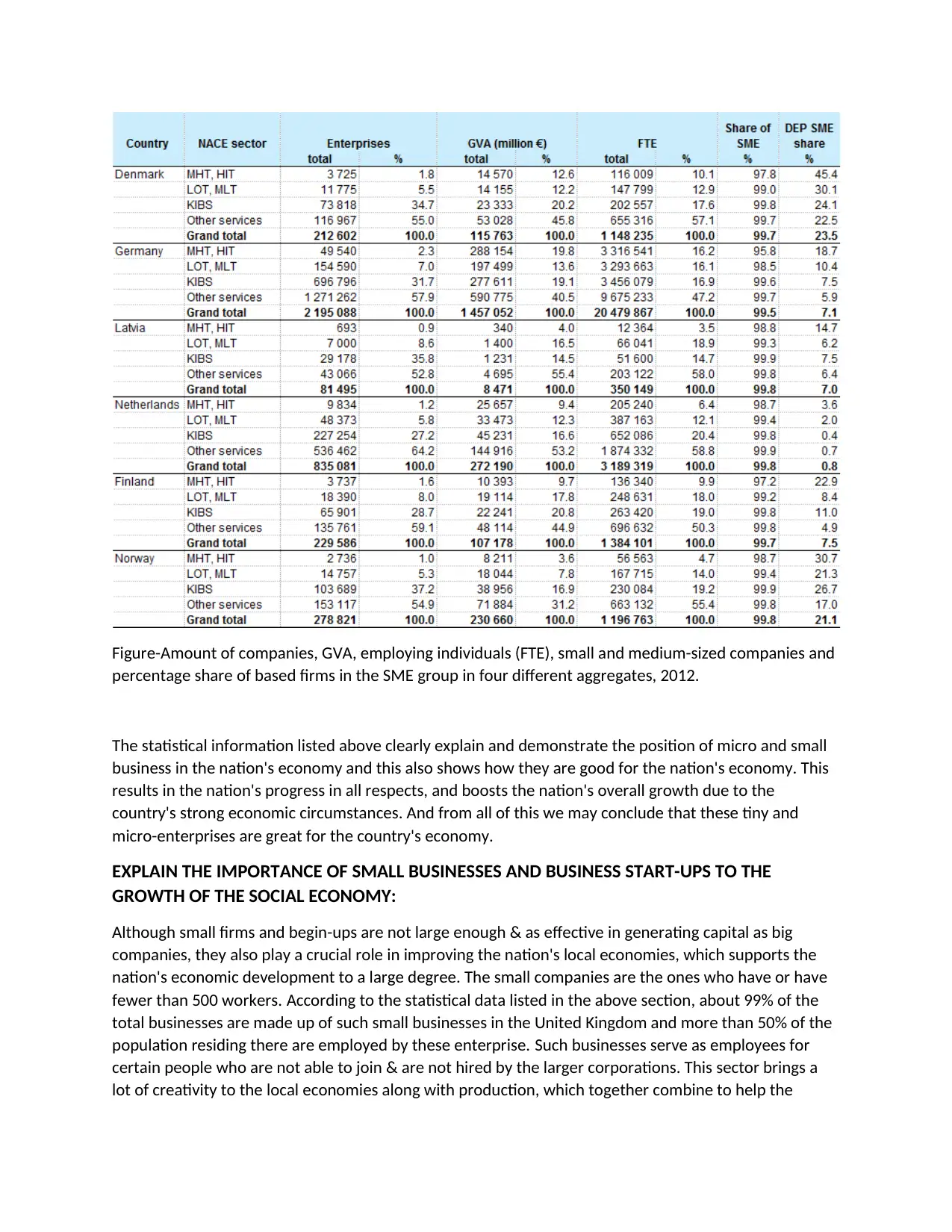
Figure-Amount of companies, GVA, employing individuals (FTE), small and medium-sized companies and
percentage share of based firms in the SME group in four different aggregates, 2012.
The statistical information listed above clearly explain and demonstrate the position of micro and small
business in the nation's economy and this also shows how they are good for the nation's economy. This
results in the nation's progress in all respects, and boosts the nation's overall growth due to the
country's strong economic circumstances. And from all of this we may conclude that these tiny and
micro-enterprises are great for the country's economy.
EXPLAIN THE IMPORTANCE OF SMALL BUSINESSES AND BUSINESS START-UPS TO THE
GROWTH OF THE SOCIAL ECONOMY:
Although small firms and begin-ups are not large enough & as effective in generating capital as big
companies, they also play a crucial role in improving the nation's local economies, which supports the
nation's economic development to a large degree. The small companies are the ones who have or have
fewer than 500 workers. According to the statistical data listed in the above section, about 99% of the
total businesses are made up of such small businesses in the United Kingdom and more than 50% of the
population residing there are employed by these enterprise. Such businesses serve as employees for
certain people who are not able to join & are not hired by the larger corporations. This sector brings a
lot of creativity to the local economies along with production, which together combine to help the
percentage share of based firms in the SME group in four different aggregates, 2012.
The statistical information listed above clearly explain and demonstrate the position of micro and small
business in the nation's economy and this also shows how they are good for the nation's economy. This
results in the nation's progress in all respects, and boosts the nation's overall growth due to the
country's strong economic circumstances. And from all of this we may conclude that these tiny and
micro-enterprises are great for the country's economy.
EXPLAIN THE IMPORTANCE OF SMALL BUSINESSES AND BUSINESS START-UPS TO THE
GROWTH OF THE SOCIAL ECONOMY:
Although small firms and begin-ups are not large enough & as effective in generating capital as big
companies, they also play a crucial role in improving the nation's local economies, which supports the
nation's economic development to a large degree. The small companies are the ones who have or have
fewer than 500 workers. According to the statistical data listed in the above section, about 99% of the
total businesses are made up of such small businesses in the United Kingdom and more than 50% of the
population residing there are employed by these enterprise. Such businesses serve as employees for
certain people who are not able to join & are not hired by the larger corporations. This sector brings a
lot of creativity to the local economies along with production, which together combine to help the
⊘ This is a preview!⊘
Do you want full access?
Subscribe today to unlock all pages.

Trusted by 1+ million students worldwide
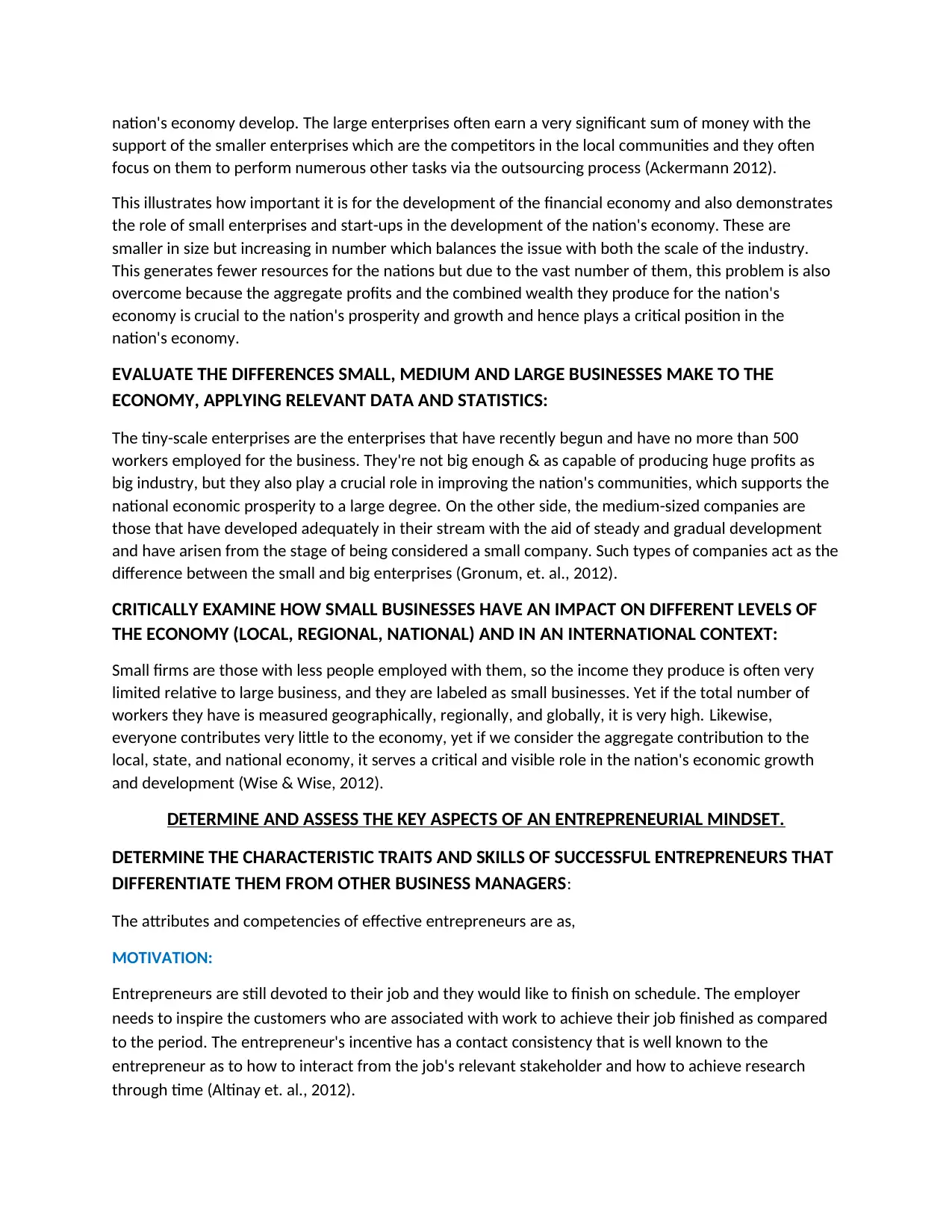
nation's economy develop. The large enterprises often earn a very significant sum of money with the
support of the smaller enterprises which are the competitors in the local communities and they often
focus on them to perform numerous other tasks via the outsourcing process (Ackermann 2012).
This illustrates how important it is for the development of the financial economy and also demonstrates
the role of small enterprises and start-ups in the development of the nation's economy. These are
smaller in size but increasing in number which balances the issue with both the scale of the industry.
This generates fewer resources for the nations but due to the vast number of them, this problem is also
overcome because the aggregate profits and the combined wealth they produce for the nation's
economy is crucial to the nation's prosperity and growth and hence plays a critical position in the
nation's economy.
EVALUATE THE DIFFERENCES SMALL, MEDIUM AND LARGE BUSINESSES MAKE TO THE
ECONOMY, APPLYING RELEVANT DATA AND STATISTICS:
The tiny-scale enterprises are the enterprises that have recently begun and have no more than 500
workers employed for the business. They're not big enough & as capable of producing huge profits as
big industry, but they also play a crucial role in improving the nation's communities, which supports the
national economic prosperity to a large degree. On the other side, the medium-sized companies are
those that have developed adequately in their stream with the aid of steady and gradual development
and have arisen from the stage of being considered a small company. Such types of companies act as the
difference between the small and big enterprises (Gronum, et. al., 2012).
CRITICALLY EXAMINE HOW SMALL BUSINESSES HAVE AN IMPACT ON DIFFERENT LEVELS OF
THE ECONOMY (LOCAL, REGIONAL, NATIONAL) AND IN AN INTERNATIONAL CONTEXT:
Small firms are those with less people employed with them, so the income they produce is often very
limited relative to large business, and they are labeled as small businesses. Yet if the total number of
workers they have is measured geographically, regionally, and globally, it is very high. Likewise,
everyone contributes very little to the economy, yet if we consider the aggregate contribution to the
local, state, and national economy, it serves a critical and visible role in the nation's economic growth
and development (Wise & Wise, 2012).
DETERMINE AND ASSESS THE KEY ASPECTS OF AN ENTREPRENEURIAL MINDSET.
DETERMINE THE CHARACTERISTIC TRAITS AND SKILLS OF SUCCESSFUL ENTREPRENEURS THAT
DIFFERENTIATE THEM FROM OTHER BUSINESS MANAGERS:
The attributes and competencies of effective entrepreneurs are as,
MOTIVATION:
Entrepreneurs are still devoted to their job and they would like to finish on schedule. The employer
needs to inspire the customers who are associated with work to achieve their job finished as compared
to the period. The entrepreneur's incentive has a contact consistency that is well known to the
entrepreneur as to how to interact from the job's relevant stakeholder and how to achieve research
through time (Altinay et. al., 2012).
support of the smaller enterprises which are the competitors in the local communities and they often
focus on them to perform numerous other tasks via the outsourcing process (Ackermann 2012).
This illustrates how important it is for the development of the financial economy and also demonstrates
the role of small enterprises and start-ups in the development of the nation's economy. These are
smaller in size but increasing in number which balances the issue with both the scale of the industry.
This generates fewer resources for the nations but due to the vast number of them, this problem is also
overcome because the aggregate profits and the combined wealth they produce for the nation's
economy is crucial to the nation's prosperity and growth and hence plays a critical position in the
nation's economy.
EVALUATE THE DIFFERENCES SMALL, MEDIUM AND LARGE BUSINESSES MAKE TO THE
ECONOMY, APPLYING RELEVANT DATA AND STATISTICS:
The tiny-scale enterprises are the enterprises that have recently begun and have no more than 500
workers employed for the business. They're not big enough & as capable of producing huge profits as
big industry, but they also play a crucial role in improving the nation's communities, which supports the
national economic prosperity to a large degree. On the other side, the medium-sized companies are
those that have developed adequately in their stream with the aid of steady and gradual development
and have arisen from the stage of being considered a small company. Such types of companies act as the
difference between the small and big enterprises (Gronum, et. al., 2012).
CRITICALLY EXAMINE HOW SMALL BUSINESSES HAVE AN IMPACT ON DIFFERENT LEVELS OF
THE ECONOMY (LOCAL, REGIONAL, NATIONAL) AND IN AN INTERNATIONAL CONTEXT:
Small firms are those with less people employed with them, so the income they produce is often very
limited relative to large business, and they are labeled as small businesses. Yet if the total number of
workers they have is measured geographically, regionally, and globally, it is very high. Likewise,
everyone contributes very little to the economy, yet if we consider the aggregate contribution to the
local, state, and national economy, it serves a critical and visible role in the nation's economic growth
and development (Wise & Wise, 2012).
DETERMINE AND ASSESS THE KEY ASPECTS OF AN ENTREPRENEURIAL MINDSET.
DETERMINE THE CHARACTERISTIC TRAITS AND SKILLS OF SUCCESSFUL ENTREPRENEURS THAT
DIFFERENTIATE THEM FROM OTHER BUSINESS MANAGERS:
The attributes and competencies of effective entrepreneurs are as,
MOTIVATION:
Entrepreneurs are still devoted to their job and they would like to finish on schedule. The employer
needs to inspire the customers who are associated with work to achieve their job finished as compared
to the period. The entrepreneur's incentive has a contact consistency that is well known to the
entrepreneur as to how to interact from the job's relevant stakeholder and how to achieve research
through time (Altinay et. al., 2012).
Paraphrase This Document
Need a fresh take? Get an instant paraphrase of this document with our AI Paraphraser
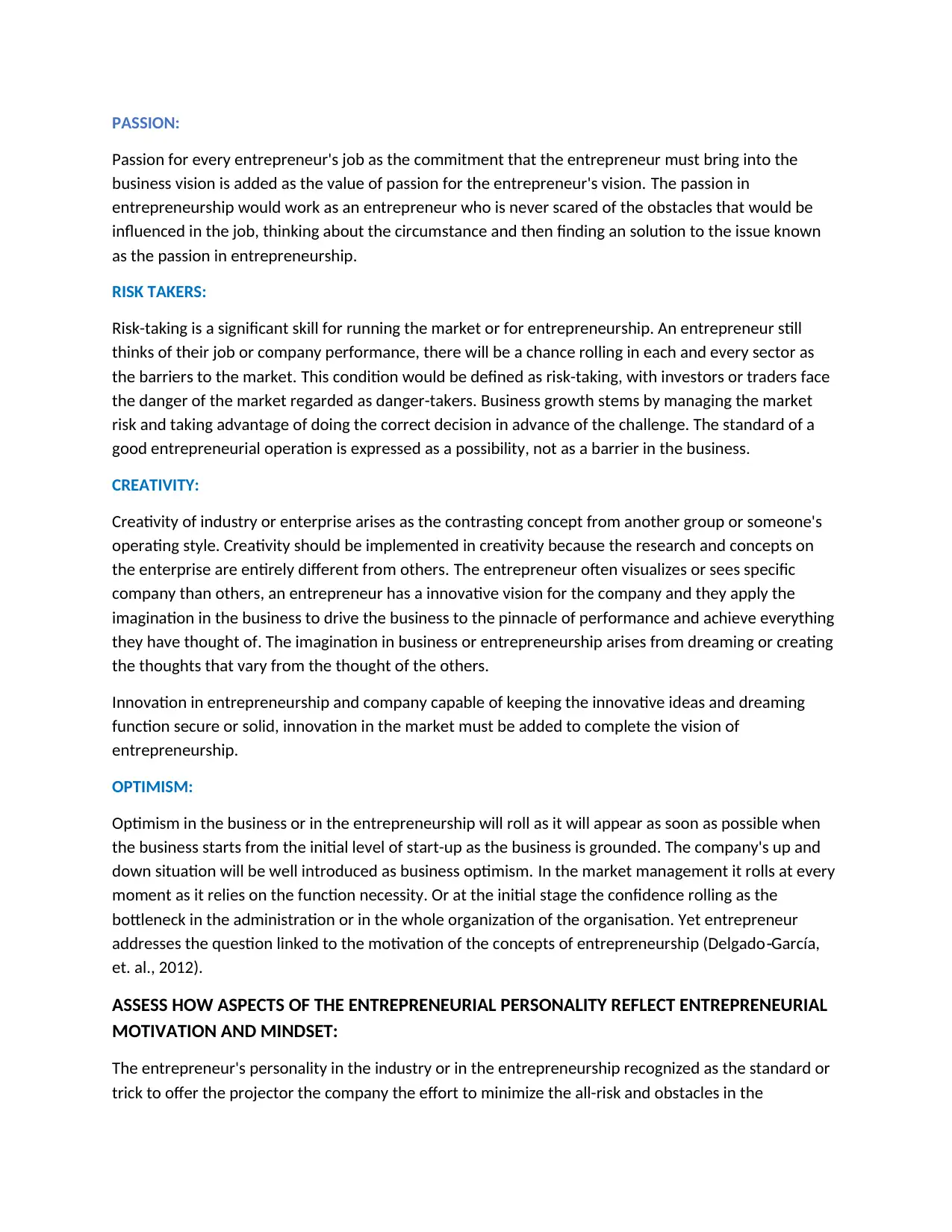
PASSION:
Passion for every entrepreneur's job as the commitment that the entrepreneur must bring into the
business vision is added as the value of passion for the entrepreneur's vision. The passion in
entrepreneurship would work as an entrepreneur who is never scared of the obstacles that would be
influenced in the job, thinking about the circumstance and then finding an solution to the issue known
as the passion in entrepreneurship.
RISK TAKERS:
Risk-taking is a significant skill for running the market or for entrepreneurship. An entrepreneur still
thinks of their job or company performance, there will be a chance rolling in each and every sector as
the barriers to the market. This condition would be defined as risk-taking, with investors or traders face
the danger of the market regarded as danger-takers. Business growth stems by managing the market
risk and taking advantage of doing the correct decision in advance of the challenge. The standard of a
good entrepreneurial operation is expressed as a possibility, not as a barrier in the business.
CREATIVITY:
Creativity of industry or enterprise arises as the contrasting concept from another group or someone's
operating style. Creativity should be implemented in creativity because the research and concepts on
the enterprise are entirely different from others. The entrepreneur often visualizes or sees specific
company than others, an entrepreneur has a innovative vision for the company and they apply the
imagination in the business to drive the business to the pinnacle of performance and achieve everything
they have thought of. The imagination in business or entrepreneurship arises from dreaming or creating
the thoughts that vary from the thought of the others.
Innovation in entrepreneurship and company capable of keeping the innovative ideas and dreaming
function secure or solid, innovation in the market must be added to complete the vision of
entrepreneurship.
OPTIMISM:
Optimism in the business or in the entrepreneurship will roll as it will appear as soon as possible when
the business starts from the initial level of start-up as the business is grounded. The company's up and
down situation will be well introduced as business optimism. In the market management it rolls at every
moment as it relies on the function necessity. Or at the initial stage the confidence rolling as the
bottleneck in the administration or in the whole organization of the organisation. Yet entrepreneur
addresses the question linked to the motivation of the concepts of entrepreneurship (Delgado García,‐
et. al., 2012).
ASSESS HOW ASPECTS OF THE ENTREPRENEURIAL PERSONALITY REFLECT ENTREPRENEURIAL
MOTIVATION AND MINDSET:
The entrepreneur's personality in the industry or in the entrepreneurship recognized as the standard or
trick to offer the projector the company the effort to minimize the all-risk and obstacles in the
Passion for every entrepreneur's job as the commitment that the entrepreneur must bring into the
business vision is added as the value of passion for the entrepreneur's vision. The passion in
entrepreneurship would work as an entrepreneur who is never scared of the obstacles that would be
influenced in the job, thinking about the circumstance and then finding an solution to the issue known
as the passion in entrepreneurship.
RISK TAKERS:
Risk-taking is a significant skill for running the market or for entrepreneurship. An entrepreneur still
thinks of their job or company performance, there will be a chance rolling in each and every sector as
the barriers to the market. This condition would be defined as risk-taking, with investors or traders face
the danger of the market regarded as danger-takers. Business growth stems by managing the market
risk and taking advantage of doing the correct decision in advance of the challenge. The standard of a
good entrepreneurial operation is expressed as a possibility, not as a barrier in the business.
CREATIVITY:
Creativity of industry or enterprise arises as the contrasting concept from another group or someone's
operating style. Creativity should be implemented in creativity because the research and concepts on
the enterprise are entirely different from others. The entrepreneur often visualizes or sees specific
company than others, an entrepreneur has a innovative vision for the company and they apply the
imagination in the business to drive the business to the pinnacle of performance and achieve everything
they have thought of. The imagination in business or entrepreneurship arises from dreaming or creating
the thoughts that vary from the thought of the others.
Innovation in entrepreneurship and company capable of keeping the innovative ideas and dreaming
function secure or solid, innovation in the market must be added to complete the vision of
entrepreneurship.
OPTIMISM:
Optimism in the business or in the entrepreneurship will roll as it will appear as soon as possible when
the business starts from the initial level of start-up as the business is grounded. The company's up and
down situation will be well introduced as business optimism. In the market management it rolls at every
moment as it relies on the function necessity. Or at the initial stage the confidence rolling as the
bottleneck in the administration or in the whole organization of the organisation. Yet entrepreneur
addresses the question linked to the motivation of the concepts of entrepreneurship (Delgado García,‐
et. al., 2012).
ASSESS HOW ASPECTS OF THE ENTREPRENEURIAL PERSONALITY REFLECT ENTREPRENEURIAL
MOTIVATION AND MINDSET:
The entrepreneur's personality in the industry or in the entrepreneurship recognized as the standard or
trick to offer the projector the company the effort to minimize the all-risk and obstacles in the
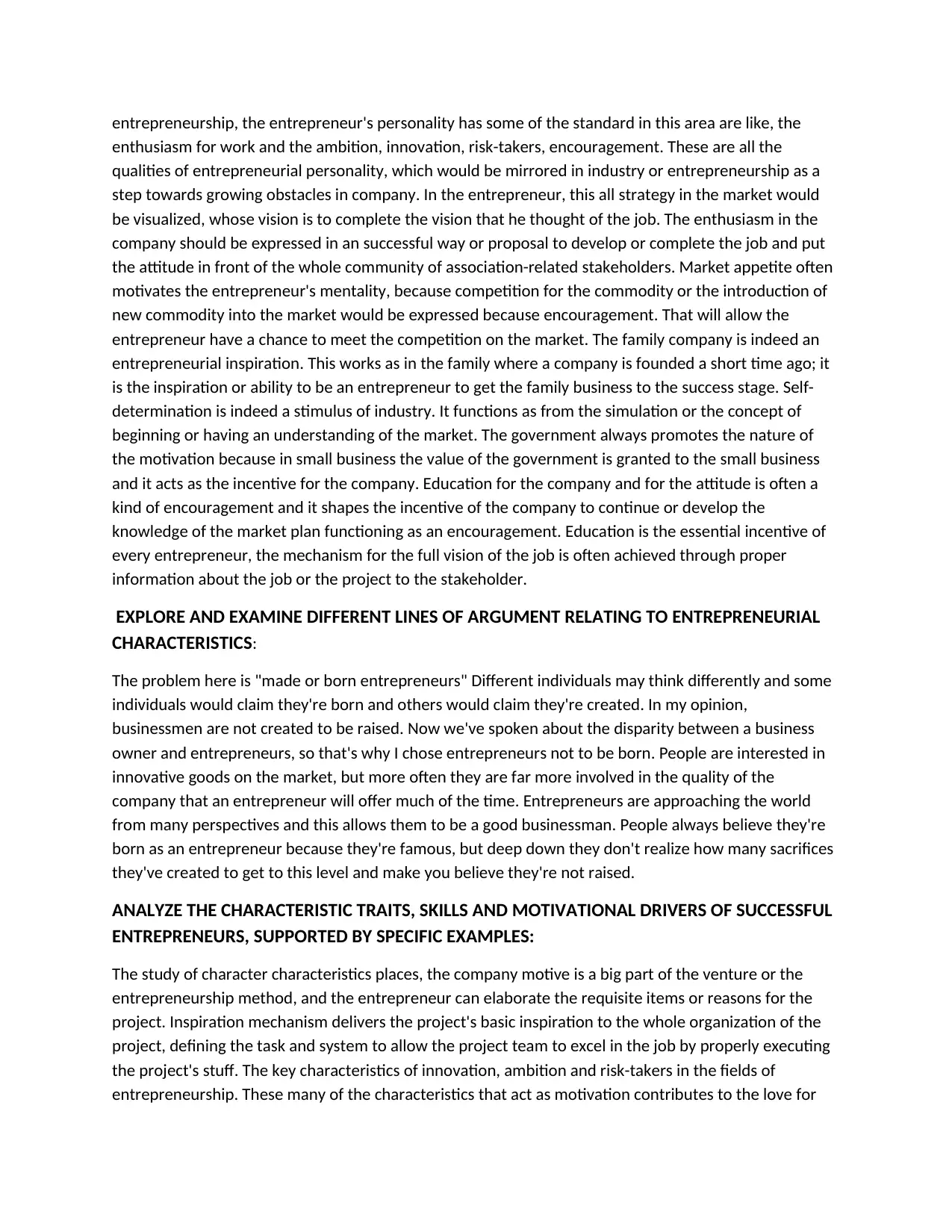
entrepreneurship, the entrepreneur's personality has some of the standard in this area are like, the
enthusiasm for work and the ambition, innovation, risk-takers, encouragement. These are all the
qualities of entrepreneurial personality, which would be mirrored in industry or entrepreneurship as a
step towards growing obstacles in company. In the entrepreneur, this all strategy in the market would
be visualized, whose vision is to complete the vision that he thought of the job. The enthusiasm in the
company should be expressed in an successful way or proposal to develop or complete the job and put
the attitude in front of the whole community of association-related stakeholders. Market appetite often
motivates the entrepreneur's mentality, because competition for the commodity or the introduction of
new commodity into the market would be expressed because encouragement. That will allow the
entrepreneur have a chance to meet the competition on the market. The family company is indeed an
entrepreneurial inspiration. This works as in the family where a company is founded a short time ago; it
is the inspiration or ability to be an entrepreneur to get the family business to the success stage. Self-
determination is indeed a stimulus of industry. It functions as from the simulation or the concept of
beginning or having an understanding of the market. The government always promotes the nature of
the motivation because in small business the value of the government is granted to the small business
and it acts as the incentive for the company. Education for the company and for the attitude is often a
kind of encouragement and it shapes the incentive of the company to continue or develop the
knowledge of the market plan functioning as an encouragement. Education is the essential incentive of
every entrepreneur, the mechanism for the full vision of the job is often achieved through proper
information about the job or the project to the stakeholder.
EXPLORE AND EXAMINE DIFFERENT LINES OF ARGUMENT RELATING TO ENTREPRENEURIAL
CHARACTERISTICS:
The problem here is "made or born entrepreneurs" Different individuals may think differently and some
individuals would claim they're born and others would claim they're created. In my opinion,
businessmen are not created to be raised. Now we've spoken about the disparity between a business
owner and entrepreneurs, so that's why I chose entrepreneurs not to be born. People are interested in
innovative goods on the market, but more often they are far more involved in the quality of the
company that an entrepreneur will offer much of the time. Entrepreneurs are approaching the world
from many perspectives and this allows them to be a good businessman. People always believe they're
born as an entrepreneur because they're famous, but deep down they don't realize how many sacrifices
they've created to get to this level and make you believe they're not raised.
ANALYZE THE CHARACTERISTIC TRAITS, SKILLS AND MOTIVATIONAL DRIVERS OF SUCCESSFUL
ENTREPRENEURS, SUPPORTED BY SPECIFIC EXAMPLES:
The study of character characteristics places, the company motive is a big part of the venture or the
entrepreneurship method, and the entrepreneur can elaborate the requisite items or reasons for the
project. Inspiration mechanism delivers the project's basic inspiration to the whole organization of the
project, defining the task and system to allow the project team to excel in the job by properly executing
the project's stuff. The key characteristics of innovation, ambition and risk-takers in the fields of
entrepreneurship. These many of the characteristics that act as motivation contributes to the love for
enthusiasm for work and the ambition, innovation, risk-takers, encouragement. These are all the
qualities of entrepreneurial personality, which would be mirrored in industry or entrepreneurship as a
step towards growing obstacles in company. In the entrepreneur, this all strategy in the market would
be visualized, whose vision is to complete the vision that he thought of the job. The enthusiasm in the
company should be expressed in an successful way or proposal to develop or complete the job and put
the attitude in front of the whole community of association-related stakeholders. Market appetite often
motivates the entrepreneur's mentality, because competition for the commodity or the introduction of
new commodity into the market would be expressed because encouragement. That will allow the
entrepreneur have a chance to meet the competition on the market. The family company is indeed an
entrepreneurial inspiration. This works as in the family where a company is founded a short time ago; it
is the inspiration or ability to be an entrepreneur to get the family business to the success stage. Self-
determination is indeed a stimulus of industry. It functions as from the simulation or the concept of
beginning or having an understanding of the market. The government always promotes the nature of
the motivation because in small business the value of the government is granted to the small business
and it acts as the incentive for the company. Education for the company and for the attitude is often a
kind of encouragement and it shapes the incentive of the company to continue or develop the
knowledge of the market plan functioning as an encouragement. Education is the essential incentive of
every entrepreneur, the mechanism for the full vision of the job is often achieved through proper
information about the job or the project to the stakeholder.
EXPLORE AND EXAMINE DIFFERENT LINES OF ARGUMENT RELATING TO ENTREPRENEURIAL
CHARACTERISTICS:
The problem here is "made or born entrepreneurs" Different individuals may think differently and some
individuals would claim they're born and others would claim they're created. In my opinion,
businessmen are not created to be raised. Now we've spoken about the disparity between a business
owner and entrepreneurs, so that's why I chose entrepreneurs not to be born. People are interested in
innovative goods on the market, but more often they are far more involved in the quality of the
company that an entrepreneur will offer much of the time. Entrepreneurs are approaching the world
from many perspectives and this allows them to be a good businessman. People always believe they're
born as an entrepreneur because they're famous, but deep down they don't realize how many sacrifices
they've created to get to this level and make you believe they're not raised.
ANALYZE THE CHARACTERISTIC TRAITS, SKILLS AND MOTIVATIONAL DRIVERS OF SUCCESSFUL
ENTREPRENEURS, SUPPORTED BY SPECIFIC EXAMPLES:
The study of character characteristics places, the company motive is a big part of the venture or the
entrepreneurship method, and the entrepreneur can elaborate the requisite items or reasons for the
project. Inspiration mechanism delivers the project's basic inspiration to the whole organization of the
project, defining the task and system to allow the project team to excel in the job by properly executing
the project's stuff. The key characteristics of innovation, ambition and risk-takers in the fields of
entrepreneurship. These many of the characteristics that act as motivation contributes to the love for
⊘ This is a preview!⊘
Do you want full access?
Subscribe today to unlock all pages.

Trusted by 1+ million students worldwide
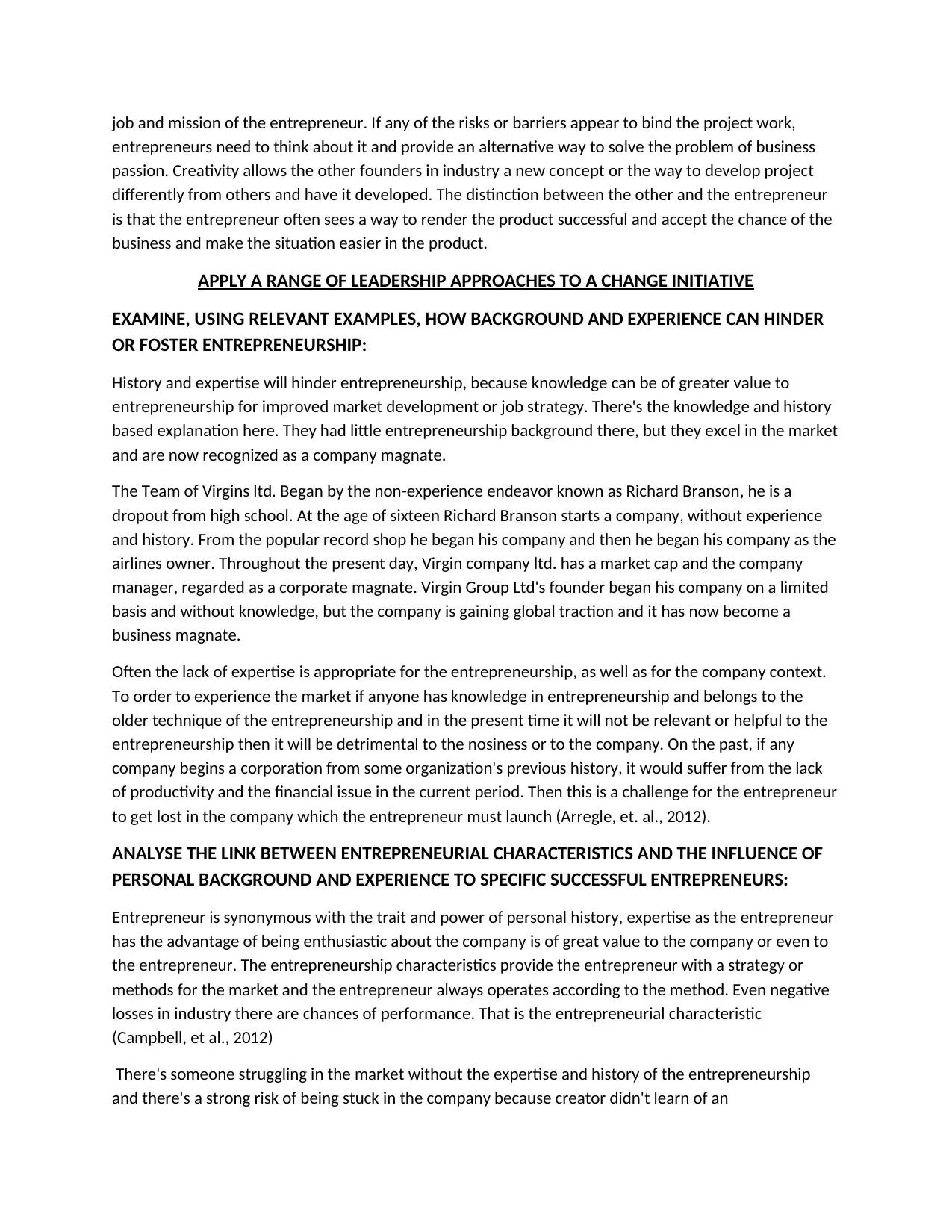
job and mission of the entrepreneur. If any of the risks or barriers appear to bind the project work,
entrepreneurs need to think about it and provide an alternative way to solve the problem of business
passion. Creativity allows the other founders in industry a new concept or the way to develop project
differently from others and have it developed. The distinction between the other and the entrepreneur
is that the entrepreneur often sees a way to render the product successful and accept the chance of the
business and make the situation easier in the product.
APPLY A RANGE OF LEADERSHIP APPROACHES TO A CHANGE INITIATIVE
EXAMINE, USING RELEVANT EXAMPLES, HOW BACKGROUND AND EXPERIENCE CAN HINDER
OR FOSTER ENTREPRENEURSHIP:
History and expertise will hinder entrepreneurship, because knowledge can be of greater value to
entrepreneurship for improved market development or job strategy. There's the knowledge and history
based explanation here. They had little entrepreneurship background there, but they excel in the market
and are now recognized as a company magnate.
The Team of Virgins ltd. Began by the non-experience endeavor known as Richard Branson, he is a
dropout from high school. At the age of sixteen Richard Branson starts a company, without experience
and history. From the popular record shop he began his company and then he began his company as the
airlines owner. Throughout the present day, Virgin company ltd. has a market cap and the company
manager, regarded as a corporate magnate. Virgin Group Ltd's founder began his company on a limited
basis and without knowledge, but the company is gaining global traction and it has now become a
business magnate.
Often the lack of expertise is appropriate for the entrepreneurship, as well as for the company context.
To order to experience the market if anyone has knowledge in entrepreneurship and belongs to the
older technique of the entrepreneurship and in the present time it will not be relevant or helpful to the
entrepreneurship then it will be detrimental to the nosiness or to the company. On the past, if any
company begins a corporation from some organization's previous history, it would suffer from the lack
of productivity and the financial issue in the current period. Then this is a challenge for the entrepreneur
to get lost in the company which the entrepreneur must launch (Arregle, et. al., 2012).
ANALYSE THE LINK BETWEEN ENTREPRENEURIAL CHARACTERISTICS AND THE INFLUENCE OF
PERSONAL BACKGROUND AND EXPERIENCE TO SPECIFIC SUCCESSFUL ENTREPRENEURS:
Entrepreneur is synonymous with the trait and power of personal history, expertise as the entrepreneur
has the advantage of being enthusiastic about the company is of great value to the company or even to
the entrepreneur. The entrepreneurship characteristics provide the entrepreneur with a strategy or
methods for the market and the entrepreneur always operates according to the method. Even negative
losses in industry there are chances of performance. That is the entrepreneurial characteristic
(Campbell, et al., 2012)
There's someone struggling in the market without the expertise and history of the entrepreneurship
and there's a strong risk of being stuck in the company because creator didn't learn of an
entrepreneurs need to think about it and provide an alternative way to solve the problem of business
passion. Creativity allows the other founders in industry a new concept or the way to develop project
differently from others and have it developed. The distinction between the other and the entrepreneur
is that the entrepreneur often sees a way to render the product successful and accept the chance of the
business and make the situation easier in the product.
APPLY A RANGE OF LEADERSHIP APPROACHES TO A CHANGE INITIATIVE
EXAMINE, USING RELEVANT EXAMPLES, HOW BACKGROUND AND EXPERIENCE CAN HINDER
OR FOSTER ENTREPRENEURSHIP:
History and expertise will hinder entrepreneurship, because knowledge can be of greater value to
entrepreneurship for improved market development or job strategy. There's the knowledge and history
based explanation here. They had little entrepreneurship background there, but they excel in the market
and are now recognized as a company magnate.
The Team of Virgins ltd. Began by the non-experience endeavor known as Richard Branson, he is a
dropout from high school. At the age of sixteen Richard Branson starts a company, without experience
and history. From the popular record shop he began his company and then he began his company as the
airlines owner. Throughout the present day, Virgin company ltd. has a market cap and the company
manager, regarded as a corporate magnate. Virgin Group Ltd's founder began his company on a limited
basis and without knowledge, but the company is gaining global traction and it has now become a
business magnate.
Often the lack of expertise is appropriate for the entrepreneurship, as well as for the company context.
To order to experience the market if anyone has knowledge in entrepreneurship and belongs to the
older technique of the entrepreneurship and in the present time it will not be relevant or helpful to the
entrepreneurship then it will be detrimental to the nosiness or to the company. On the past, if any
company begins a corporation from some organization's previous history, it would suffer from the lack
of productivity and the financial issue in the current period. Then this is a challenge for the entrepreneur
to get lost in the company which the entrepreneur must launch (Arregle, et. al., 2012).
ANALYSE THE LINK BETWEEN ENTREPRENEURIAL CHARACTERISTICS AND THE INFLUENCE OF
PERSONAL BACKGROUND AND EXPERIENCE TO SPECIFIC SUCCESSFUL ENTREPRENEURS:
Entrepreneur is synonymous with the trait and power of personal history, expertise as the entrepreneur
has the advantage of being enthusiastic about the company is of great value to the company or even to
the entrepreneur. The entrepreneurship characteristics provide the entrepreneur with a strategy or
methods for the market and the entrepreneur always operates according to the method. Even negative
losses in industry there are chances of performance. That is the entrepreneurial characteristic
(Campbell, et al., 2012)
There's someone struggling in the market without the expertise and history of the entrepreneurship
and there's a strong risk of being stuck in the company because creator didn't learn of an
Paraphrase This Document
Need a fresh take? Get an instant paraphrase of this document with our AI Paraphraser
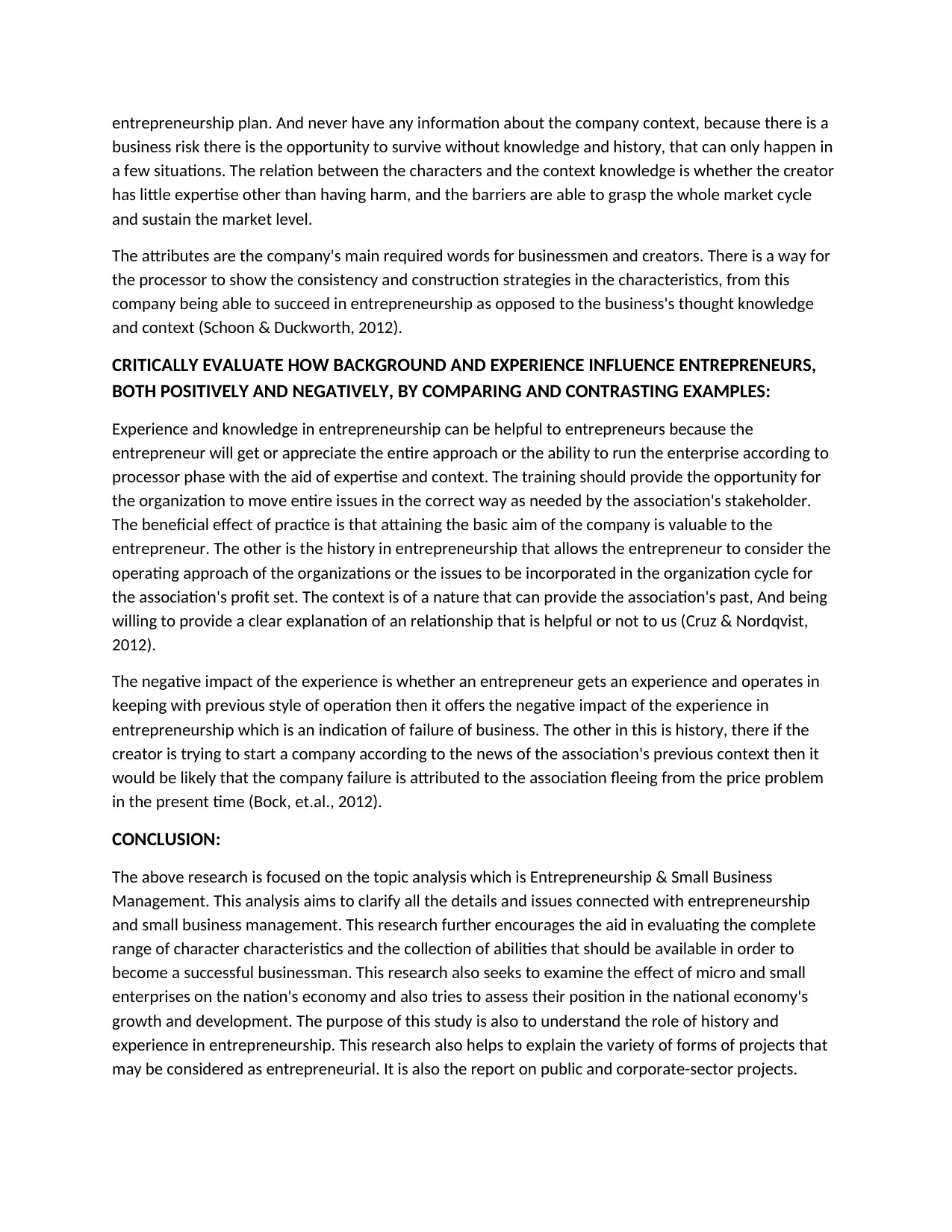
entrepreneurship plan. And never have any information about the company context, because there is a
business risk there is the opportunity to survive without knowledge and history, that can only happen in
a few situations. The relation between the characters and the context knowledge is whether the creator
has little expertise other than having harm, and the barriers are able to grasp the whole market cycle
and sustain the market level.
The attributes are the company's main required words for businessmen and creators. There is a way for
the processor to show the consistency and construction strategies in the characteristics, from this
company being able to succeed in entrepreneurship as opposed to the business's thought knowledge
and context (Schoon & Duckworth, 2012).
CRITICALLY EVALUATE HOW BACKGROUND AND EXPERIENCE INFLUENCE ENTREPRENEURS,
BOTH POSITIVELY AND NEGATIVELY, BY COMPARING AND CONTRASTING EXAMPLES:
Experience and knowledge in entrepreneurship can be helpful to entrepreneurs because the
entrepreneur will get or appreciate the entire approach or the ability to run the enterprise according to
processor phase with the aid of expertise and context. The training should provide the opportunity for
the organization to move entire issues in the correct way as needed by the association's stakeholder.
The beneficial effect of practice is that attaining the basic aim of the company is valuable to the
entrepreneur. The other is the history in entrepreneurship that allows the entrepreneur to consider the
operating approach of the organizations or the issues to be incorporated in the organization cycle for
the association's profit set. The context is of a nature that can provide the association's past, And being
willing to provide a clear explanation of an relationship that is helpful or not to us (Cruz & Nordqvist,
2012).
The negative impact of the experience is whether an entrepreneur gets an experience and operates in
keeping with previous style of operation then it offers the negative impact of the experience in
entrepreneurship which is an indication of failure of business. The other in this is history, there if the
creator is trying to start a company according to the news of the association's previous context then it
would be likely that the company failure is attributed to the association fleeing from the price problem
in the present time (Bock, et.al., 2012).
CONCLUSION:
The above research is focused on the topic analysis which is Entrepreneurship & Small Business
Management. This analysis aims to clarify all the details and issues connected with entrepreneurship
and small business management. This research further encourages the aid in evaluating the complete
range of character characteristics and the collection of abilities that should be available in order to
become a successful businessman. This research also seeks to examine the effect of micro and small
enterprises on the nation's economy and also tries to assess their position in the national economy's
growth and development. The purpose of this study is also to understand the role of history and
experience in entrepreneurship. This research also helps to explain the variety of forms of projects that
may be considered as entrepreneurial. It is also the report on public and corporate-sector projects.
business risk there is the opportunity to survive without knowledge and history, that can only happen in
a few situations. The relation between the characters and the context knowledge is whether the creator
has little expertise other than having harm, and the barriers are able to grasp the whole market cycle
and sustain the market level.
The attributes are the company's main required words for businessmen and creators. There is a way for
the processor to show the consistency and construction strategies in the characteristics, from this
company being able to succeed in entrepreneurship as opposed to the business's thought knowledge
and context (Schoon & Duckworth, 2012).
CRITICALLY EVALUATE HOW BACKGROUND AND EXPERIENCE INFLUENCE ENTREPRENEURS,
BOTH POSITIVELY AND NEGATIVELY, BY COMPARING AND CONTRASTING EXAMPLES:
Experience and knowledge in entrepreneurship can be helpful to entrepreneurs because the
entrepreneur will get or appreciate the entire approach or the ability to run the enterprise according to
processor phase with the aid of expertise and context. The training should provide the opportunity for
the organization to move entire issues in the correct way as needed by the association's stakeholder.
The beneficial effect of practice is that attaining the basic aim of the company is valuable to the
entrepreneur. The other is the history in entrepreneurship that allows the entrepreneur to consider the
operating approach of the organizations or the issues to be incorporated in the organization cycle for
the association's profit set. The context is of a nature that can provide the association's past, And being
willing to provide a clear explanation of an relationship that is helpful or not to us (Cruz & Nordqvist,
2012).
The negative impact of the experience is whether an entrepreneur gets an experience and operates in
keeping with previous style of operation then it offers the negative impact of the experience in
entrepreneurship which is an indication of failure of business. The other in this is history, there if the
creator is trying to start a company according to the news of the association's previous context then it
would be likely that the company failure is attributed to the association fleeing from the price problem
in the present time (Bock, et.al., 2012).
CONCLUSION:
The above research is focused on the topic analysis which is Entrepreneurship & Small Business
Management. This analysis aims to clarify all the details and issues connected with entrepreneurship
and small business management. This research further encourages the aid in evaluating the complete
range of character characteristics and the collection of abilities that should be available in order to
become a successful businessman. This research also seeks to examine the effect of micro and small
enterprises on the nation's economy and also tries to assess their position in the national economy's
growth and development. The purpose of this study is also to understand the role of history and
experience in entrepreneurship. This research also helps to explain the variety of forms of projects that
may be considered as entrepreneurial. It is also the report on public and corporate-sector projects.
1 out of 11
Related Documents
Your All-in-One AI-Powered Toolkit for Academic Success.
+13062052269
info@desklib.com
Available 24*7 on WhatsApp / Email
![[object Object]](/_next/static/media/star-bottom.7253800d.svg)
Unlock your academic potential
Copyright © 2020–2025 A2Z Services. All Rights Reserved. Developed and managed by ZUCOL.




